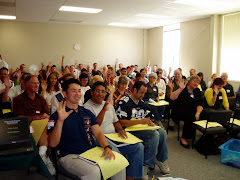My understanding about learning is, we are always learning. In fact we are never not learning. We are learning machines, wired to learn from our very first breath and as we grow we learn  from our every experience we have on our life's journey.
from our every experience we have on our life's journey.
 from our every experience we have on our life's journey.
from our every experience we have on our life's journey.This can be either good or bad. It can make us or break us for we are constantly learning.
So I figure that the flip side of always learning is that we are also, always teaching.
You with me on this?
Are you paying attention?
Stay with me and pay close attention... now!
We are teaching others in our every communication, gesture, grunt or wave of our hand. In our every email reply, our twitter posting or regular blog posts. We are teaching others when we yell, shout or whisper to those near us or across the room. This teaching we are doing is conveyed to those around us and may not necessarily be conscious and deliberate learning but non-conscious and covert learning. Parents teach their children about life's likes and dislikes before they themselves can say "...mummy" and this learning stays with them well on into their adult lives. If children are the reflection of their parents then staff are the reflection of management and students are the reflection of their teachers and lecturers etc... in either whole or in part. 

How many of you have now begun to struggle with this message. (Startin' to feel a little uncomfortable, aye?)
A good teacher remains conscious of what they are teaching their students and knows how both the formal and informal lessons are both important and contribute to the total learning experience the student has. Over time this will reflect in their behaviour and attitude and provide a framework which they will use to guide their career - or not.
An Example or Two
Managers who are not aware of the way they respond to staff when they make a mistake or achieve the months KPI's will be teaching their staff how to respond in similar situations in the future. You may have taught them by your response, that it's unsafe to make a mistake at work, so hide it if you do. That you don't get praised for achieving the months KPI's, so they've learnt to not push any harder than they need to, as the extra work goes unnoticed by management.
A daughter breaks a much loved ornament and brings the pieces to mum crying with the many pieces in her hand. Mum growls and is angry at the daughter and tells her that she is clumsy and did a dumb and stupid thing. What is mum teaching in that brief moment of time? That it is unsafe to tell mum when you've done something wrong. In the years to come mum may be heart broken as her daughter no longer shares her hopes and dreams or concerns with her mother and the lines of intimacy have been drawn.
A husband says some sharp words to his wife in a heated argument one evening. She responds by being upset and goes to their room crying. He realises that what he said was inappropriate and unkind. He tentatively goes to her and says in a sincere manner, "I'm sorry honey, I didn't mean what I said and I shouldn't have said what I did. Please forgive me". She tells him sorry wont fix it and then takes the offensive and pushes him away and starts her on barrage of words. He repeats his apology to her, with her not accepting it, followed by a day or more of distancing and detachment.
to her and says in a sincere manner, "I'm sorry honey, I didn't mean what I said and I shouldn't have said what I did. Please forgive me". She tells him sorry wont fix it and then takes the offensive and pushes him away and starts her on barrage of words. He repeats his apology to her, with her not accepting it, followed by a day or more of distancing and detachment.
 to her and says in a sincere manner, "I'm sorry honey, I didn't mean what I said and I shouldn't have said what I did. Please forgive me". She tells him sorry wont fix it and then takes the offensive and pushes him away and starts her on barrage of words. He repeats his apology to her, with her not accepting it, followed by a day or more of distancing and detachment.
to her and says in a sincere manner, "I'm sorry honey, I didn't mean what I said and I shouldn't have said what I did. Please forgive me". She tells him sorry wont fix it and then takes the offensive and pushes him away and starts her on barrage of words. He repeats his apology to her, with her not accepting it, followed by a day or more of distancing and detachment. What do you think he has just learnt? (please reverse the gender roles to better suit your own situation). I'm sure you've got it, aye? That's right, he's (or she) learnt not to apologise as it does nothing to fix things between the 2 of them. If the kids are present at the time, they also have learnt how to respond when it's their turn to fight with either mum or dad!
You'll have your own examples of these all too common situations of teaching others based on our responses. I have specifically focused on the negatives in the examples I've used. There are of course positives that are taught to others in exactly the same way. At the very point of every response you make, as the direct result of a specific situation that has occured. You are teaching others how to or how not to behaviour should a similar situation arise for them in the future. In essence, you have created an expectation response within the other person (good or bad?).
Awareness of What You're Doing
Become more conscious of how you are responding to others. Ask the question "What am I teaching them if I respond in this manner?"
If you want others to be more aggressive then treat them aggressively. If you want them to be forgiving then show them forgiveness. If you want a situation to escalate where negative emotions become an acceptable way to react then model that to others. If you want a person to tell the truth then reward them for telling you the truth even though what they have said may have hurt you.
The world has an uncanny way of reflecting back to us what we put out there. What are you projecting to those around you? What are you teaching them with your every response? And is there a need for you to consider a change for the better?
Do you truely understand the role that you have played in creating the behaviour or attitude that you are experiencing from others, based on how you have responded to them in the past? Do you understand that you have in some small way contributed to the attitudes and behaviours around you?
I wonder, what is it exactly, that you are teaching them?

















































No comments:
Post a Comment